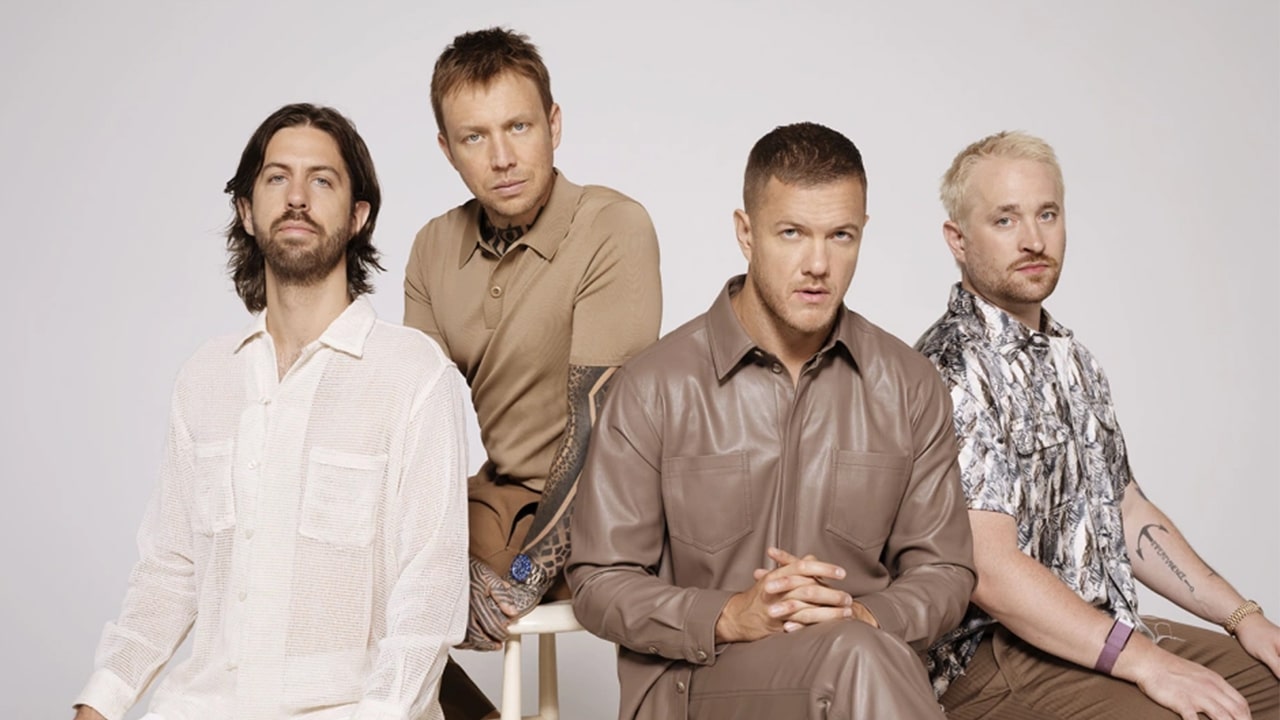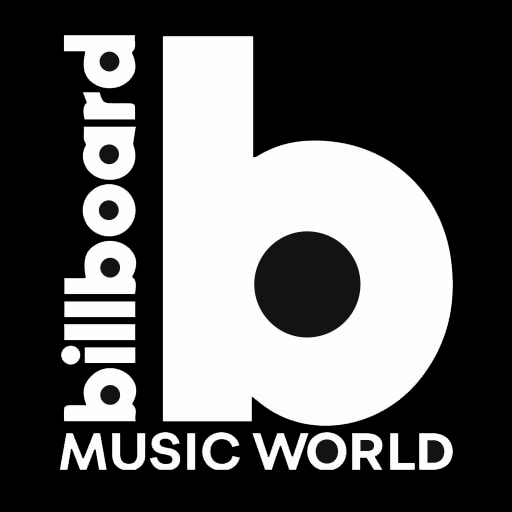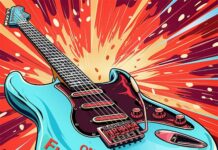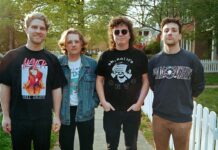“You know, writing pop music is really complex,” Dan Reynolds says, stretching the word “really” with an emphatic earnestness in his voice. Dressed in a perfectly fitted white tee and gray plaid trousers while convening with his Imagine Dragons bandmates in a private room at the Equinox Hotel in downtown New York City, the voice behind some of the biggest rock hits of the past decade is explaining why he considers himself a pop songwriter.

“It’s so funny to me when people are like, ‘Well of course I could do pop music, but I choose this [other genre],’” he continues. Reynolds and his bandmates — guitarist Wayne Sermon, bassist Ben McKee and drummer Daniel “Platz” Platzman — are overlooking Manhattan’s bustling Hudson Yards, have just wrapped the third leg of their Mercury World Tour in support of their sixth studio set, this year’s double album Mercury — Acts 1 & 2. “I’m like, ‘Great pop music? Like, big songs that live on? That’s actually really hard.’”
Imagine Dragons presents itself as a new-school rock group, with a guitar-heavy sound and colossal beats influenced in equal parts by hip-hop, folk, industrial rock and electro-pop. But the frontman’s knack for crafting universal anthems is rooted in an understanding of the hooks found in top-tier pop music.
Ever since the Las Vegas quartet’s 2012 debut album, Night Visions, sent singles like “Radioactive,” “Demons” and “It’s Time” roaring into the mainstream consciousness, Imagine Dragons have grown to become arguably the biggest rock band in America, presenting a decade of evidence that mainstream guitar-driven music is not dead by consistently scoring hits on a myriad of charts, including within the upper reaches of the Hot 100.
The success that the band has reached over the course of the last ten years is at a level that even most pop stars can only dream of: more than 17 million equivalent album units with 14.8 billion official on-demand streams in the U.S., per Luminate; nineteen Hot 100 hits, 5 top 10 albums on the Billboard 200, 12 entries on the Radio Songs chart (including 7 top 10 hits and 2 No. 1s), nearly two dozen top 10 hits on the Hot Rock Songs chart; and four monster singles (“Radioactive,” “Demons,” “Believer” and, as of last July, “Thunder”) certified Diamond by the Recording Industry Association of America, which began counting on-demand streams towards certification in 2013. For the record, that last tally is more than any other band, and only one less than Bruno Mars’ high-water mark of five.
“We typically don’t talk numbers much, because it’s just… I don’t even know that it’s overwhelming, we just don’t, really,” says Reynolds, his brow furrowed. “When it’s so wild like that, I think there’s no way to wrap your head around it. It all feels like a simulation – weird, crazy, just like, ‘OK! What does that even mean?’”
And yet, despite the steady string of chart-toppers, mind-blowing statistics and enormous worldwide fandom, it can feel like the Dragons have also somehow spent the entirety of their career flying under the radar — or, at the very least, outside the glow of critical acclaim and serious media consideration.
Just take “Bones,” their latest crossover hit from 2022’s Mercury — Acts 1 & 2. With its chanted chorus, warped vocals and lyrics tinged with cynicism (“My patience is waning/ Is this entertaining?”), the single has so far peaked at No. 6 on the Hot Rock & Alternative Songs chart and garnered 139.9 million on-demand streams, according to Luminate. It was preceded by an even bigger smash in “Enemy,” featuring the rapper J.I.D, which landed itself in the top 5 of the Hot 100, at No. 3 on both Billboard Global charts and at No. 1 on Radio Songs, amassing 371.5 million U.S. on-demand streams. In reality, the official numbers for “Enemy” don’t even do the song’s impact justice: the track was also featured on the soundtrack for the Netflix animated series Arcane: League of Legends, which sparked another quarter-billion video streams of user-generated content associated with the wildly popular video game.
Ten years in, Imagine Dragons are a rarity – a rock band producing genuine hits on pop radio, capturing hip-hop listeners and bringing in fans from across all kinds of generational and genre divides. And yet, Imagine Dragons didn’t score a single Grammy nomination when this year’s spate of nods was announced, their latest album was largely ignored by critics upon its arrival, and both “Enemy” and “Bones” went unremarked upon by popular music outlets after being sent to radio.
For his part, Rick Rubin sees something special in the Dragons. “It’s a band of virtuosos beyond the instruments that each member is known for,” says the legendary producer, who helmed “Enemy,” “Bones” and the rest of the group’s latest double album. “The songwriting is very, very strong, and they treat each song based on the identity of the song, not the identity of the band… Most bands aren’t capable of this metamorphosis. Dan’s personality as the singer is signature enough [on its own] to let us know it’s Imagine Dragons.”
According to the band members, that commitment to treating each song as its own entity has been intentional from the beginning of their career. Reynolds points to their pedigree as graduates of Berklee College of Music as the foundation for the diverse musicality of their catalog: “It makes writing pop music fun because they have such a depth of jazz musicianship,” he says. Sermons adds, “As far as genre, too… people see as a [positive] that we’ve really never felt stuck in any one sound.”
The guitarist cites the way the band has veered from the folksy stomp of “It’s Time” to the buoyant pop of “On Top of the World” to electro-pop (2018 Origins-era single “Bad Liar”), hip-hop (Origins deep cut “Bullet in a Gun”), industrial rock (early Mercury B-side “Cutthroat”) and arena rock (“Believer”) as proof of their maneuverability. “So we just do whatever we want ’cause, amazingly, our fans let us do that.”
And over the years, Reynolds’ songwriting has fueled that penchant for genre-hopping. The frontman’s sweeping lyricism puts a megaphone to the internal conflicts and emotions we all face — from rage, regret and inadequacy to perseverance, triumph, courage and hope — and then presents them to the masses. “Demons,” the quartet’s second top 10 single, is a perfect example: a mid-tempo ballad that cycles through nearly all the aforementioned feelings in less than three minutes, as Reynolds’ gravelly voice wails, “Don’t get too close/ It’s dark inside/ It’s where my demons hide.”
“I think the success of their music is a demonstration that personal is, at its core, universal,” says Mac Reynolds, the band’s longtime manager (and Dan’s brother). “Dan has always been insistent on writing his own lyrics and going to a vulnerable place, and people feel and relate to that vulnerability in a powerful way. When you find yourself in a song, your connection to it sticks around for a long time, and diamond records are more about longevity than anything else in the end.”
For his part, the frontman can’t put a finger on the secret to why his songs tend to touch fans on such an elemental level. “I think there’s just a place that feels very personal with music,” he says. “And I think that personal level of lyric connects with people in a different way. I think we do it in a specific way that feels very specific to Imagine Dragons. And it just seems to connect us with people who feel a similar way, whether it’s about depression or joy or sorrow or…It’s all very emotion-based, whereas not all music is that way, right?”
Another unique ingredient to Imagine Dragons’ success is the fact that they’ve largely been left to their own devices in charting their own narrative — choosing singles and in some ways A&R’ing each of their albums. “It feels very self-guided with the best possible team standing underneath us,” Reynolds says of working with KIDinaKORNER, the Interscope Records imprint the band has been signed to since 2011. “But we certainly are the masters of our [fate] when it comes to creative, when it comes to the songs. We’ve chosen them and it’s worked.”
Case in point: “I remember when we were picking ‘Believer’ as the lead single for [2017’s] Evolve, there were people who did not want that song to be the lead single that were very prevalent in our artistic life with the label,” the frontman continues. “They still, at the end of the day, said, ‘OK, we’ll let you guys go with it.’ But I remember sitting down in the meeting with our label and someone very powerful saying, ‘That song will never be a hit.’ And we said, ‘I disagree, that song will be a hit.’ That’s exactly how it went.” “Believer” peaked at No. 4 on the Hot 100, reigning over the Hot Rock Songs chart for a whopping 29 weeks and even putting it on par with 2012’s “Radioactive” as one of their biggest hits to date.
Reynolds and his bandmates have always painted with grandiose strokes in the studio, and their Herculean songs get to be played for audiences the world over on a near-constant basis — thanks to the foursome’s status as dedicated road warriors who keep leveling up their venue size to match their bombastic sonic palette.
Having graduated step by step from bars and clubs to amphitheaters and arenas over ten years’ worth of touring, the quartet finally added stadiums to their 2022 live slate for the first time, selling out everywhere from Rice-Eccles Stadium in Salt Lake City and Allegiant Stadium in their native Las Vegas to Toronto’s Rogers Centre and Banc of California Stadium in L.A. (The European leg of the tour this summer also included stops at more eclectic venues in order to meet demand — from equestrian racecourses in Milan and Paris to an unfinished civil and military airport in northern Poland.) Overall, the 59 shows throughout the year grossed $87.5 million and sold a total of 1.1 million tickets, according to Billboard Boxscore. On the year-end Boxscore charts, the band finished at No. 21 on Top Tours, No. 13 on Top Ticket Sales and No. 10 on the Top Rock Tours tally.
“It feels like we’re on the biggest stage we’ve ever been on in our lives, but it also feels like we belong there,” McKee says. “It feels like we’re in our element, like this is the environment that this music and our performance thrives best in. And it’s great. We’ve never had, I think, enough room to fully spread our wings before. And now it’s just a giant canvas for us to paint upon.”
“I think that being outdoors feels [like] that’s where Dragons are supposed to be,” Reynolds adds. “Something about the open sky and the songs and the grandiosity of it all…It just all feels like, you know, if we could’ve imagined it, this is where we would want to be.”
It’s certainly all a far cry from their earliest days, when they were playing shows on top of parking garages and opening for AWOLNATION in the wake of Night Visions’ release, still going to their own merch table after each set. “Back then, it was all of us and our entire crew packed onto one bus with, like, a trailer hauling our equipment behind us,” McKee recalls, likening the time to “Pirates of the Caribbean or something. And now it’s, you know, 20 different big rig trucks and I don’t even know how many buses hauling around our stage everywhere.”
As for how their live show could rise even higher in the future, Reynolds cites U2’s famous 360° Tour from 2009 to 2011 as an example of how to innovate down the line. The singer references Bono and co. as a personal inspiration for a multitude of reasons, from the veteran rockers’ approach to touring to their longstanding activism as a band.
“I grew up listening to a lot of U2,” he says, calling The Joshua Tree one of his all-time favorite records. “I always saw them being involved with worldwide causes. And it felt real and it felt impactful and it felt important. And it was also part of the band….It felt like a full circle thing. Like, it was more than music.” To that end, Imagine Dragons have championed the LGBTQ+ community, pediatric cancer patients and women in the recording industry with initiatives like LOVELOUD, the Tyler Robinson Foundation and McKee’s ongoing partnership with the Women’s Audio Mission.
Earlier this year, Imagine Dragons also added aiding Ukraine’s fight against Russian invasion to their list of causes, after President Volodymyr Zelenskyy personally reached out to the band — given their massive popularity in the war-torn country — for a one-on-one meeting. “His two big things were, ‘One, when you’re on tour, tell the people in America not to forget about us. Please help us get in the headlines and keep us in the headlines because we need help,’” Reynolds recalls. “‘And two, a real way you can help is the United 24 effort,’” referencing a government-sponsored initiative to provide desperately needed ambulances in the war-torn country.
Holding court with a world leader would’ve been unthinkable for the Imagine Dragons ten years ago, back when they were scraping by on the verge of releasing Night Visions. Their debut album has since cemented its place at No. 7 on Billboard’s end-of-the-decade chart for the entire 2010s, just behind the likes of fellow behemoths such as Adele’s 21, Taylor Swift’s 1989 and Ed Sheeran’s Divide.
“It feels like yesterday, for sure, in some weird ways,” says Reynolds of the Night Visions era. “But it also feels like a lifetime ago. Being in the studio doing, like, the stomp-claps for ‘It’s Time’ at the Palms, banging on all the trash cans and stuff for ‘Working Man’ and ‘Nothing Left to Say’… a lot of cool memories come back that were a very youthful Imagine Dragons, where we were just having fun experimenting.”
To celebrate its milestone 10-year anniversary, Imagine Dragons reissued a super deluxe edition of Night Visions earlier this year, featuring two previously-unreleased demos from the album’s recording sessions, though Reynolds admits there were upward of 200 other Night Visions-era songs they could’ve chosen to dust off from the vault. In fact, he jokingly throws out the idea of releasing a “super, super, super deluxe” edition somewhere down the road for the band’s 30th anniversary. Or maybe a 300-song holographic retrospective for their 50th, McKee gleefully counters.
And while the band may or may not be serious about someday unleashing Night Visions on the world in its entirety, they’re now looking to the future and what’s left for the Dragons to conquer.
“Sustainability, I think, is our ultimate goal,” Reynolds says. “To do this as long as we can. I mean, look – we certainly are always driven. To the point where just the other day, we were like, ‘What could our next record sound like if we do this? This could be really cool. Maybe we do it here with these people in this way…’ But we believe that there’s still a lot of gas in the tank, and we’re determined to push ourselves and try to be the best versions of Imagine Dragons we can, and make our show better and bigger.
“Yeah, I don’t know,” he concludes with a sigh. “We dream endlessly, and at this point, we’re looking to just keep dreaming.”






